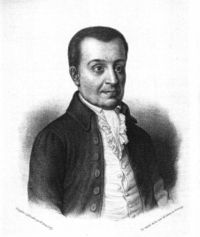
Juan Martinez de Rozas
Encyclopedia

Chile
Chile ,officially the Republic of Chile , is a country in South America occupying a long, narrow coastal strip between the Andes mountains to the east and the Pacific Ocean to the west. It borders Peru to the north, Bolivia to the northeast, Argentina to the east, and the Drake Passage in the far...
an struggle for independence.
He was born at Mendoza
Mendoza, Argentina
Mendoza is the capital city of Mendoza Province, in Argentina. It is located in the northern-central part of the province, in a region of foothills and high plains, on the eastern side of the Andes. As of the , Mendoza's population was 110,993...
(then, still a Chilean dependency) in 1759, the son of Juan Martínez de Soto Rozas and María Prudencia Correa Villegas. In his early life he was a professor of law, theology
Theology
Theology is the systematic and rational study of religion and its influences and of the nature of religious truths, or the learned profession acquired by completing specialized training in religious studies, usually at a university or school of divinity or seminary.-Definition:Augustine of Hippo...
and philosophy
Philosophy
Philosophy is the study of general and fundamental problems, such as those connected with existence, knowledge, values, reason, mind, and language. Philosophy is distinguished from other ways of addressing such problems by its critical, generally systematic approach and its reliance on rational...
at Santiago
Santiago, Chile
Santiago , also known as Santiago de Chile, is the capital and largest city of Chile, and the center of its largest conurbation . It is located in the country's central valley, at an elevation of above mean sea level...
. He held the post of acting governor of Concepción
Concepción, Chile
Concepción is a city in Chile, capital of Concepción Province and of the Biobío Region or Region VIII. Greater Concepción is the second-largest conurbation in the country, with 889,725 inhabitants...
at one time, and was also colonel in a militia regiment.
In 1808 he became secretary to the last Spanish
Spain
Spain , officially the Kingdom of Spain languages]] under the European Charter for Regional or Minority Languages. In each of these, Spain's official name is as follows:;;;;;;), is a country and member state of the European Union located in southwestern Europe on the Iberian Peninsula...
governor, Francisco Antonio García Carrasco
Francisco Antonio García Carrasco
Francisco Antonio García Carrasco Díaz was a Spanish soldier and Royal Governor of Chile. His political relations with Juan Martinez de Rozas and a smuggling scandal involving the frigate Scorpion destroyed what little authority he had, and required that he surrender his post to Mateo de Toro...
, and used his position to prepare the nationalist movement that began in 1809. After resigning his position as secretary, Rozas was mainly responsible for the resignation of the Spanish governor, and the formation of a national Junta
Junta (Peninsular War)
In the Napoleonic era, junta was the name chosen by several local administrations formed in Spain during the Peninsular War as a patriotic alternative to the official administration toppled by the French invaders...
on September 18, 1810 of which he was the real leader. After the death of the President and Vice President of the First Government Junta
Government Junta of Chile (1810)
Government Junta of the Kingdom of Chile , also known as the First Government Junta, was the organ established to rule Chile following the deposition and imprisonment of King Ferdinand VII by Napoleon Bonaparte...
, he acted as Interim President.
Under his influence many reforms were initiated, freedom of trade was established, an army was organized and a national congress was called together in July 1811. His influence began to wane with the Figueroa mutiny
Figueroa mutiny
Figueroa mutiny was a failed attempt to restore royal power and is the first coup d'état to ever take place in Chile.- Background :...
, and by the end of 1811 divisions began to arise between Rozas followers from Concepción and the men of Santiago. Also a feud broke out between Rozas and José Miguel Carrera
José Miguel Carrera
José Miguel Carrera Verdugo was a Chilean general, member of the prominent Carrera family, and considered one of the founders of independent Chile. Carrera was the most important leader of the Chilean War of Independence during the period of the Patria Vieja...
, who had secured control of Santiago. In 1812 Carrera succeeded in securing the banishment of his rival, who was forced to retire to Mendoza
Mendoza, Argentina
Mendoza is the capital city of Mendoza Province, in Argentina. It is located in the northern-central part of the province, in a region of foothills and high plains, on the eastern side of the Andes. As of the , Mendoza's population was 110,993...
, where he died on March 3, 1813.

